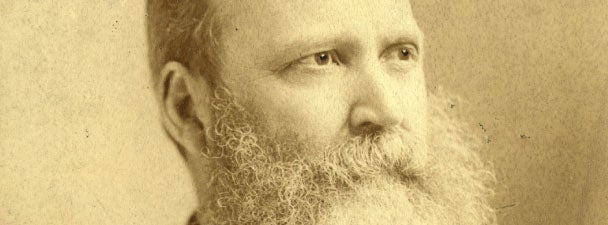
Basil Lanneau Gildersleeve did not believe in taking things slowly. At 5 years old, the Charlestonian was reading the Gospel of John – in Greek. At age 13, he enrolled at the College before heading on to Pennsylvania’s Jefferson College and then Princeton University, where he earned his bachelor’s degree in 1849 at age 18. After that, the Greek and Latin scholar studied in Europe, where he earned a doctorate from the University of Göttingen in Germany when he was 22. By age 25, he was already a professor at the University of Virginia and embarking on an impressive career of teaching and scholarship in classical philology, or literary studies.
In February, the College’s Classics department honored its 19th-century alumnus by hosting the conference Classical Charleston: History, Poetry, and War – Gildersleeve’s Past and Present. Sponsored by the Theodore B. Guérard Fund for Classical Studies, the conference featured lectures by Gildersleeve biographer Ward Briggs, Carolina distinguished professor emeritus of Classics at the University of South Carolina; Gareth Schmeling, professor emeritus at the University of Florida and an expert on the ancient novel; and professors Silvia Montiglio and Anthony Woodman, who are the Gildersleeve chairs at Johns Hopkins University and the University of Virginia, respectively.
During the opening lecture, Briggs noted that when Gildersleeve attended the College for a year in 1844, he had only 64 classmates and tuition was $80 a year. The son of a Presbyterian minister who published religious newspapers, he had grown up on Pitt Street and felt a deep identification with his hometown, despite his later wanderings. In his passport, for example, Briggs says Gildersleeve filled in the blank space designating one’s nationality as “Charleston.” Gildersleeve was proud to say, too, that he was “a Charlestonian first, Carolinian next, and then a Southerner.”

Naturally, then, Gildersleeve fought for the Confederacy during the Civil War, reporting to duty during summers, between teaching responsibilities at the University of Virginia. In 1864, while working under the command of Gen. John B. Gordon, he was shot in the leg as he carried orders. Though he avoided amputation, the wound was serious and his losses manifold. As he said, “I lost my pocket Homer, I lost my pistol. I lost one of my horses, and finally, I came very near to losing my life from a wound which kept me five months on my back.”
Following his recovery, he taught for many years at the University of Virginia and Johns Hopkins University, earning a reputation as one of America’s foremost classical scholars. Among his most acclaimed writings were “The Creed of the Old South,” a reflection on the South’s involvement in the Civil War published in The Atlantic Monthly in 1892, and – five years later and also published in The Atlantic Monthly – “A Southerner in the Peloponnesian War,” which compares the American Civil War to the conflict between Athens and Sparta more than 2,200 years earlier.
Gildersleeve also founded the American Journal of Philology in 1880 and edited it for more than 40 years. He died in 1924 and is buried in Charlottesville, Va




